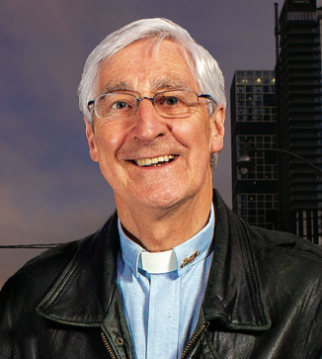
Robert Kinghorn
Robert Kinghorn is a deacon of the Archdiocese of Toronto.
You can read his column, "The Church on the Street" in The Catholic Register.
You can contact him at robert.kinghorn@ekinghorn.com
Robert Kinghorn: Mike found a home in Dismas Fellowship
It’s a simple action, almost involuntary, and we seldom give it another thought. We are asked to dip into our deep pockets as we sit in the pews, and to spare some money for the less fortunate at Christmas.
Robert Kinghorn: Walking down the lane called hope
There are some sounds you just don’t expect to hear downtown. Police and ambulance sirens intermingled with fights and screaming are commonplace, but as I passed a darkened lane, I heard the soothing sound of someone singing the 1929 chart topper, “Tiptoe through the tulips.”
Robert Kinghorn: Timely phone calls re-focus our mission
If “The Church on the Street” were a weekly contribution to The Catholic Register, then I would frequently have the wrath of the editor on my shoulders as I submit, “Walked around downtown; nothing happened. The end.” Especially in these COVID-ridden times the streets are devoid of much of the activity that unfortunately led one journalist to write-off the area as “plagued by crack addicts, drug dealers and low-rent sex trade workers.”
Robert Kinghorn: Return to the streets like coming home
We all want to be known for something. In moments of self-doubt and weakness we look back on our lives and ask ourselves, “Did my life have meaning to anyone? What will people remember me for?” Pastoral care is the ability to walk with others and to assist them in uncovering within themselves the Gospel that they have written through their lives.
Robert Kinghorn: Fighting the fight against ‘alone-ness’
Many years ago, I heard the story of a school principal in South Africa who quit his job rather than submit to the school’s apartheid policy of racial discrimination. His friends told him he was crazy, but he said, “One day I am going to meet God, and God will ask me, ‘Where are your wounds?’ If I reply that I have no wounds, God will ask me, ‘Was there nothing that was worth fighting for?’ I could not face that question.”
Robert Kinghorn: Violence and grief grip the night
At school I was told that before the advent of radio and television, the great novelists such as Charles Dickens would write their books to be read around the fireplace in the evening. In so doing they would make their chapters short enough for an evening’s read and closed with a cliff-hanger.
Robert Kinghorn: The noble journey can be torturous
I have always wondered about the names they choose for sports teams: the Vikings, the Giants, the Predators. Vicious sounding names that strike fear into the hearts of the opposition.
Robert Kinghorn: A journey down soft side of street
Often, we do not see the softer side of people’s nature as they put up a facade of toughness and independence. This is especially true on the streets where the law of the street is, “Don’t show weakness, don’t show compassion.”
It was a different time and a different crisis, but in the small village of Bronte, Ont., work was hard to come by in the early 1950s.
Robert Kinghorn: If I knew then what I know now…
Driving downtown, the weather forecast came on the radio: “The temperature tonight is expected to plummet to a low of minus-14 degrees with a windchill factor making it feel like minus-25. The health department has issued a warning that at these temperatures frostbite to exposed skin can occur within minutes.”
